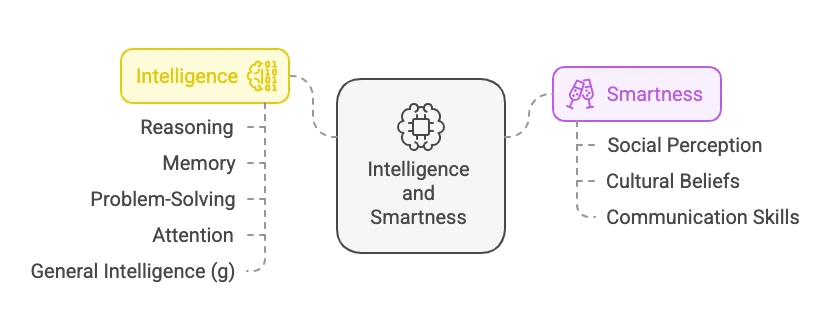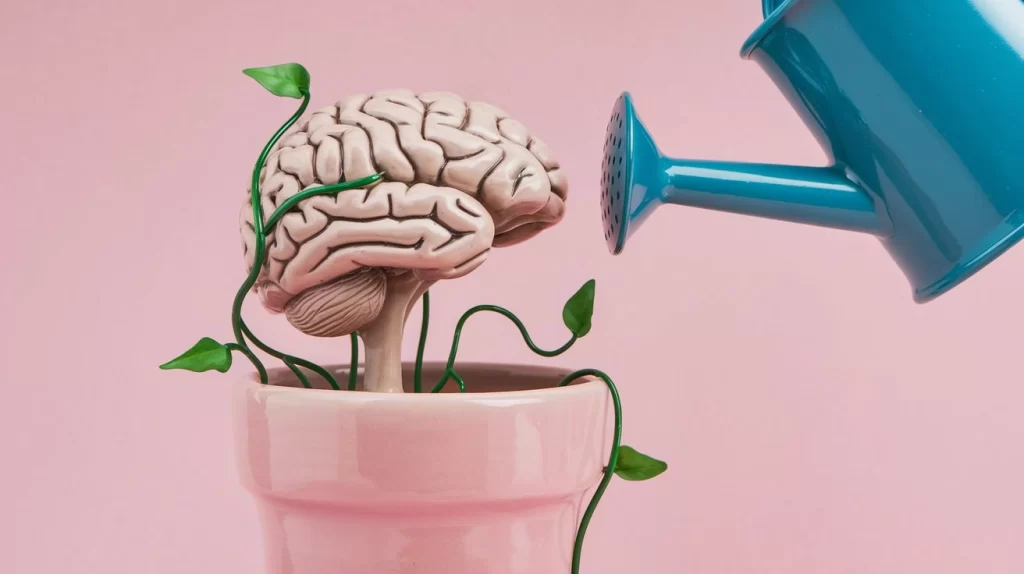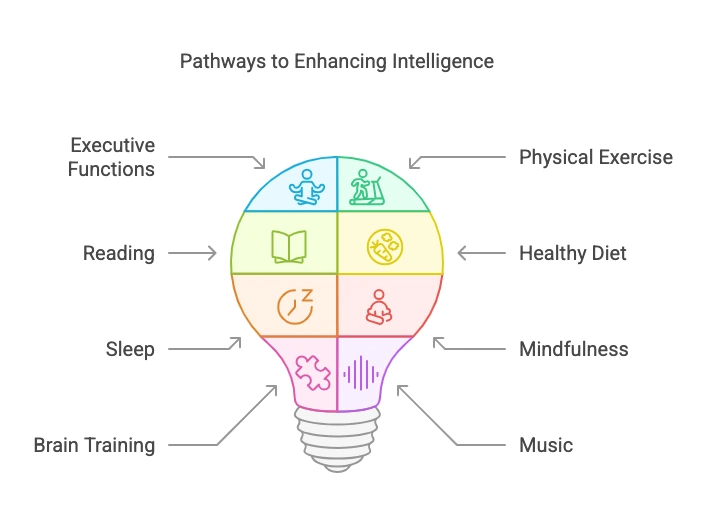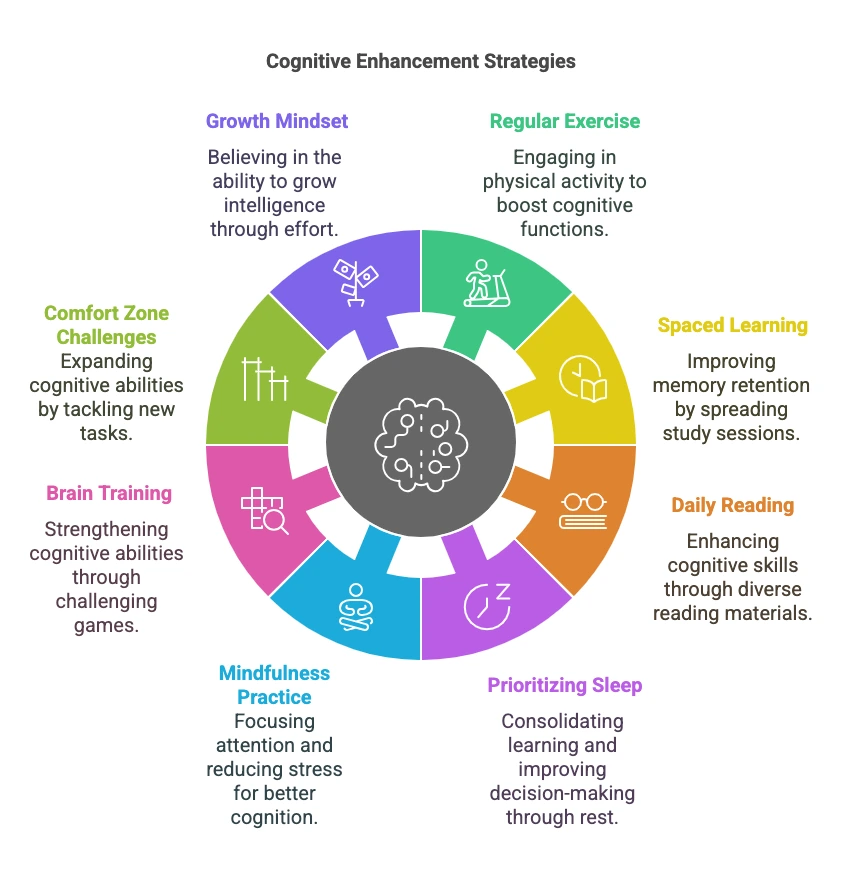Jump to the section
- Key Learnings
- How Does Your Brain Work?
- What is Intelligence and Smartness?
- The Power of Growth Mindset
- What Improves Your Intelligence?
- 9 Practical Strategies to Get Smarter
- Strategy 1: Engage in Regular Exercise
- Strategy 2: Practice Spaced Learning
- Strategy 3: Read Daily
- Strategy 4: Put Sleeping First
- Strategy 5: Practice Mindfulness
- Strategy 6: Engage in Brain Training
- Strategy 7: Get out of your Comfort Zone
- Strategy 8: Cultivate a Growth Mindset
- Strategy 9: Use multiple Learning Methods
- Start Your Journey to Getting Smarter
- FAQs
- References
Key Learnings
#1
Your Brain is Always Growing
Neuroplasticity helps your brain toadapt and improve at any stage of your life. Every challenge strengthens your neural pathways. You can actively enhance intelligence through effort and intentional practice.
#2
Smart Habits Drive Smarter Thinking
Integrate strategies like regular exercise, spaced learning, and mindfulness. They boost memory, focus, and creativity. These also strengthen your cognitive abilities, adapt to challenges, and lead with clarity.
#3
A Growth Mindset is Key
A growth mindset empowers you to embrace challenges and turn failures into opportunities for growth. You can inspire not only yourself but also your team to aim higher and grow.
#4
Balance is Essential for Growth
Effective cognitive growth requires a mix of effort and recovery. Combine strategies like brain training with adequate sleep and relaxation as to ensure your mind stays sharp and ready for whatever comes next.
Did you ever ask how to become the smartest person you can be? Imagine a sharper mind that helps you navigate the complexities of being a leader, tackle intricate projects, and dance with ease around challenges. Not a far-off dream, but a tangible goal grounded in science and strategy, you can unleash untapped potential and become a more effective leader and thinker by improving your cognitive abilities.

Cognition comprises mental processes that help perceive, understand, and store valuable information. This process helps in decision-making, learning, and innovation [Festa et al., 2023]. Strong cognitive skills mean leaders and managers can quickly adapt to new information, strategize effectively, and approach problems more creatively and uniquely. Increasingly, success at work will depend on your capacity for clear thought, effective priorities, and continual learning.
What makes this possible? Neuroplasticity—the ability of the brain to change and grow depending on experience—makes cognitive enhancement possible at any point in life [Jolles & Van Leijenhorst, 2020], [Hardy et al., 2015]. For example, learning a new competence, such as playing a musical instrument or mastering a complex leadership framework, can change neural pathways. This is sharpening the mind and making it more flexible.
This article provides science-backed ways how to get smarter, giving you actionable steps from neuroscience and psychology that can be used to help unleash human potential. Whether leading a team or managing a difficult project, these strategies are guaranteed to enhance your performance. They are opening wide horizons of possibilities in the field of your expertise. How to get smarter is not a question, but it is indeed a journey with the right mindset and tools to begin today.

🧠 Unlock Your Brain’s Full Potential: 9 Strategies to Get Smarter!
How Does Your Brain Work?
The first step to being smart is appreciating the great ability of the brain to change and grow. You can develop your cognitive skills through practice, repetition of the activation of neural pathways, and embracing the principles of neuroplasticity. Whether you are learning a new skill or trying to deal with some problems in your work, being intentional with your brain will help you reach your full potential.
The Basics of Brain Learning
The brain contains approximately 85 billion neurons, which are specialized cells functioning like messengers. These neurons send electrical signals that enable the brain to process information, store it, and later retrieve the information [Blanchette Sarrasin et al., 2020]. So, when a person learns to ride a bicycle, neurons in one’s brain send messages to muscles, coordinating balance and movement. Over time, those connections strengthen, turning first stumbling into effortless ability.
These connections serve as pathways, transporting knowledge throughout the various regions of the brain. Think of them like highways—smoothly paved and highly traveled ones, as well as ones that haven’t yet been built. The more you go down a pathway, the more robust it grows. The concept is one of the big reasons why rehearsal is essential in developing a talent and is part of the large keys to becoming intelligent [Blanchette Sarrasin et al., 2020].
How Neural Networks Works
Each neuron can be in contact with as many as 10,000 others, forming an incredibly dense web of connections. This neural network is very much like a spider’s web—elaborately woven, highly structured, and undergoing constant reorganization. These connections allow your brain to handle enormous quantities of information in parallel, forming the basis for learning and problem-solving.

Each time these networks are activated during practice, they are strengthened, and the tasks begin to feel more natural. For example, continued practice in a new language strengthens those neural “highways” and makes using vocabulary and grammar much easier to access and use [Blanchette Sarrasin et al., 2020].
Neuroplasticity: The Brain’s Ability to Change
Neuronal plasticity refers to the changeability and reorganization of the brain regarding new experiences. Similarly to how muscles grow through exercise, the brain remolds itself in response to challenging situations—when a new skill is being learned or when solving difficult problems [Jolles & Van Leijenhorst, 2020], [Blanchette Sarrasin et al., 2020]. In other words, how to become smarter is not something fixed, but it’s an achievable goal for everyone who uses appropriate strategies.
The Role of Daily Activities and Sleep
Activities of everyday life, such as walking your dog, socializing, or reading, become, unbeknownst to them, part of building neural connections. Simple actions exercise your brain and contribute to its development. Another critical factor is sleep. The brain replays and consolidates pathways during sleep that were formed during the day, acting much like a nightly “review session” that solidifies learning [Jolles & Van Leijenhorst, 2020], [Blanchette Sarrasin et al., 2020].
What is Intelligence and Smartness?
Defining Intelligence
Intelligence is a complex and multi-dimensional concept, involving reasoning, memory, problem-solving, and attention. Instead of being a single skill, intelligence is the coordination of these mental processes [Spanoudis et al., 2020]. For instance, solving a complex problem or developing a strategic plan involves your cognitive faculties functioning in unison to produce the desired outcome.
At the core of intelligence lies the notion of “general intelligence” (g). This idea suggests a shared mental ability that influences your performance across various tasks. Whether you’re writing a report, analyzing data, or managing a project, “g” plays a pivotal role. This interconnected nature highlights that intelligence extends beyond one domain, affecting attention, working memory, reasoning, and even self-awareness. These features together constitute the meaning of being smart in academic and professional settings [Spanoudis et al., 2020].
Defining Smartness
Smartness, on the other hand, is a more general and socially mediated term. It generally reflects how others perceive your abilities in dealing with them [Kramer et al., 2021]. For instance, a leader who quickly grasps new concepts or speaks with authority about solutions may be tagged as “smart,” even though their success stems from communication skills rather than raw intelligence.
Personal and cultural beliefs also sway the perception of smartness. For example, some people believe that being smart means excelling in math; others attribute it to creativity or emotional intelligence. Such views differ greatly and depend on social norms and values [Kramer et al., 2021]. In one culture, being smart may mean success in academics; in another culture, it could be adaptability or skills in interaction with others.

Distinguishing Intelligence and Smartness
Intelligence and smartness are not identical, although many people think of them as identical. Intelligence is simply the toolset in your head: memory, reasoning, and all those other fascinating abilities. Smartness, however, reflects your ability to use that toolkit effectively.
Think of intelligence as possessing a toolbox. You might have all the tools necessary to construct anything, but how to become smarter lies in knowing when and how to use those tools. Nothing gets done, no matter how well-stocked one’s toolbox, without applied practice [Kramer et al., 2021].
The Power of Growth Mindset
Research has shown that intelligence is not fixed. It can be developed through effort, learning, and persistence [Believing You Can Get Smarter Makes You Smarter, 2003], [Growth-Within, 2024]. From this premise grew the idea of a growth mindset: the belief in the ability of intelligence to develop over time and with dedication. People with a growth mindset are more likely to take on challenges and persist through difficult times while continuing to develop their abilities.

On the other side, a fixed mindset—the view that intelligence is fixed—limits growth. People with such a mindset will tend to recoil from challenges, believing they cannot improve by nature. A growth mindset makes one resilient, and it will help unlock your potential how to be smart in all areas of life [Kramer et al., 2021].
What Improves Your Intelligence?
Intelligence is the combination of important mental abilities, such as reasoning, memory, and problem-solving. Unlike fixed traits, it can be improved with specific strategies and continuous effort. Intelligence refers to more general cognitive processes, and “smartness” often reflects how well these abilities are deployed in everyday life. This is given social and cultural contexts [Kramer et al., 2021].

Executive Functions for Cognitive Skills
One of the key areas in cognitive enhancement is executive functions: the core skills of the brain that control thoughts and behavior. These are working memory (for holding and manipulating information), cognitive flexibility (for switching between tasks), and attention (for staying focused). Leaders use these cognitive skills every day. They prioritize, manage change, and also keep in control of their own emotions. For example, when managing deadlines or guiding people through ambiguity, strong executive functions are responsible for keeping clarity and being in control of the decision-making process [Jolles et al., 2020].
Developing stronger executive functions is a basis for performing well in complex tasks. It becomes a ground for anyone who wants to become a smarter person or research how to become intelligent within any challenging environment.
Physical Exercise and Enhancement of Cognition.
Exercise is more than just physical health: it’s the keystone to brain health and cognitive benefits. When done regularly, it would improve key mental capabilities, including attention, memory, and executive function. Exercise makes the nervous system more plastic, enhancing the connectivity between neurons in the brain and improving the metabolism of energy for better performance by the nervous system [Gomez-Pinilla et al., 2013].
Even very short exercise periods may have positive effects: as little as a 10-minute walk can benefit memory by strengthening functional connectivity across brain networks. The long-term accumulation of regular physical activity showed that grey matter increased in the important parts of the brain associated with the strengthening of networks in the brain related to attention and decision-making. Exercise also counteracts neural decline; thus, exercising keeps our minds sharp as we age [Festa et al., 2023].
Building resilience and clarity for leaders and managers through exercise within the daily routine, so tough, complex challenges are met with energy and focus.
Reading: A Workout for the Mind
Reading is an excellent activity to strengthen the cognitive skills you have and elevate mental performance. As you read, your brain is going to track characters’ movements, try to interpret their goals and connect the background details into a coherent narrative. That involves both your executive functions and prior knowledge in one big mental workout [Jolles et al., 2020].
Regular reading improves memory, enhances comprehension, and encourages perspective-taking by requiring you to see the world through a character’s eyes. For example, while reading a novel, your brain stitches actions and emotions together with settings to create a picture in your mind. This strengthens neural pathways that are involved in understanding and organizing complex ideas—important for problem-solving and decision-making [Jolles et al., 2020].
The more you read, the sharper your skills will be. Reading regularly has been shown to improve reading ability and deepen understanding—two things that are especially important for leaders seeking clarity, empathy, and sharper executive functions.
Healthy Diet for Brain Function
A healthy diet is important for the best functioning of the brain. It supports the energy balance necessary for mental clarity and focus. Proper nutrition restores cellular homeostasis. This is the balance that keeps brain cells functioning efficiently and resilient to stress [Gomez-Pinilla et al., 2013].
Nutrient-dense foods, such as leafy greens, fish, and nuts, provide the building blocks. They include omega-3 fatty acids and antioxidants, that protect the neurons from damage. These nutrients protect the neurons from damage and improve the capacity of the brain to process information. This improves performance in cognitive function and decision-making. A healthy diet together with exercise is going to tune up your brain for memory, problem-solving, and productivity generally [Gomez-Pinilla et al., 2013].
For leaders and managers, a healthy diet is not a matter of physical health only; it’s among the most significant strategies in maintaining focus and mental agility to lead effectively and handle complex challenges.
Sleep and Memory Consolidation for Learning
On that premise, adequate quality sleep is very foundational to the optimal functioning of the brain; acting as the support to the consolidation of neural links, filing through and ordering the information gained in a day, and finding connections between ideas or pieces of disparate information that makes much sense concerning learning acquisition [Brower, 2022].
This fuels creativity and enhances problem-solving abilities. Well-rested individuals can approach challenges with clarity, connect ideas more effectively, and innovate solutions. Quality sleep is, therefore, the way forward for leaders and managers to enhance cognitive processing, ensure sharp decision-making, and maintain the mental energy needed to guide teams through complex issues [Brower, 2022].
Sleep is not just a recovery tool; it’s a strategic asset. By making rest a priority, leaders set themselves up for success and develop the focus and adaptability that are important to excel in their work.
Mindfulness and Meditation for Focus and Cognitive Flexibility
In general, mindfulness and meditation increase focus and cognitive flexibility, two things that leaders need to possess. Essentially, it is the act of focusing one’s attention, often on one’s breath, to still the mind and decrease mind-wandering. This, in effect, impacts the default mode network in the brain—the area responsible for self-referential thinking and daydreaming—to sharpen mental clarity and enhance presence [Weder et al., 2022].
There are two big mindfulness techniques: Focused Attention (or FA for concentration on a sensation or object), and Open Monitoring (or OM—observing thoughts and sensations without judgment). Both practices increase adaptability and mental resilience, arming leaders with the ability to handle stress, act appropriately in challenging situations, and make clear, informed decisions when under pressure [Weder et al., 2022].
It brings clarity, calmness, and the possibility of leading with purpose and intention into daily routines through the incorporation of mindfulness.
Brain Training to Exercise Your Executive Functions
Brain training is a structured way of improving mental performance, focusing particularly on the executive functions: the brain’s faculties in handling thoughts, concentrating attention, and being able to adapt to new situations. It improves working memory, cognitive flexibility, and problem-solving skills through regular practice. Training strengthens neural pathways so that the brain can work more efficiently and respond better to challenges [Jolles et al., 2020].
While the term “brain training” is in common use, it would be more precise to refer to it as executive function training, as it addresses specific skills used in decision-making and being productive. The stimulation of these functions—by doing, for example, puzzles learning a new language, or even just organizing priorities in daily life—will have quite astonishing improvements [Jolles et al., 2020].
Cognitive training changes the game for leaders. Sharpen these executive functions from day to day to be more adaptable, think more strategically, and gain the mental agility to lead in a VUCA environment.
Music and Learning
Music is a special form of communication that, using sound, stirs the brain to great depths. Playing a musical instrument is an activity that gives a multisensory workout to several areas of the brain. This, therefore, strengthens memory, increases concentration, and even improves reading abilities by training the brain to recognize and interpret different patterns [Musacchia et al., 2020].
Unlike other forms of learning, music is a form of communication that combines, without words, rhythms, melodies, and emotions. The interaction this art provides engages important parts of the brain, further facilitating development and plasticity in the brain [Musacchia et al., 2020]. For leaders, the cognitive functions of music are transformed into higher concentration, creativity, and improved problem-solving—skills imperative to deal with complexities.
Adding music into your life isn’t only a creative outlet; it’s a way of improving cognitive and leadership skills that will help in developing you personally and professionally.
9 Practical Strategies to Get Smarter

Strategy 1: Engage in Regular Exercise
When you integrate physical activity into your daily life, you can enhance cognitive health and improve brain functions. Running or swimming, for example, enhances hippocampal connectivity This is an important area of the brain for memory enhancement [Festa et al., 2023]. Resistance training—for instance, with free weights or resistance bands—enhances neural growth and adaptability and thus supports the promotion of better cognitive functioning [Gomez-Pinilla et al., 2013].
Research has shown that even a 10-minute bout of low-intensity physical activity can improve memory by increasing connectivity in brain networks [Festa et al., 2023]. These benefits accrue throughout the life span, meaning that for leaders looking for sharper thinking, stronger focus, and resilience in decision-making, exercise is one of the most important tools available. Physical activity doesn’t just build the body; it’s a foundation for mental agility and professional success.
Strategy 2: Practice Spaced Learning
Spaced learning is the most effective method to improve memory and reduce memory loss. By spacing out study sessions over time, as opposed to the mass practice of cramming, you help your brain engage in processing information and storing it more efficiently. So, instead of studying for three hours at a time, break that up into three one-hour blocks or six half-hour segments [Sarrasin et al., 2020]. Adding learning breaks getting adequate sleep and learning recovery between sessions further enhances retention and understanding, solidifying what you’ve learned [Jolles et al., 2020].
Leaders can apply this strategy to master new skills or retain critical information for decision-making. It’s not about working harder but about using smarter, research-backed methods for lasting cognitive enhancement.
Strategy 3: Read Daily
Reading is an activity that is very important for improving cognitive functions such as memory improvement, comprehension, and perspective-taking. Reading a variety of materials challenges your brain to keep track of characters, remember backgrounds, and interpret goals—all of which activate executive functions [Jolles et al., 2020]. That mental processing strengthens the brain in handling complex information to develop better intellectually.
According to research, reading regularly doesn’t just build up your vocabulary; it also increases background knowledge, making you a wiser and more strategic thinker. Leaders who read strategically will gain insight that will make them much better prepared to adapt, decide, and inspire.
Strategy 4: Put Sleeping First
Prioritize sleep to nurture the brain for optimal functioning. While you sleep, your brain will consolidate what you have learned during the day, strengthening the neural connections; it will even create associations among apparently unrelated concepts. All these will improve memory consolidation, creativity, and problem-solving skills—all very helpful when facing very tough challenges [Brower, 2022].
During sleep, the brain revisits and reorganizes information from the day in a way that prepares you for better decision-making and strategic thinking. Leaders who emphasize quality rest are sharper, more innovative, and better equipped to inspire their teams. A good night’s sleep is not a luxury; it’s a leadership tool that assures success.
Strategy 5: Practice Mindfulness
The practice of mindfulness and meditation is very powerful in enhancing focus, improving cognitive flexibility, and reducing stress. In other words, mindfulness means focusing on the present and limiting mind-wandering by placing attention, usually on your breath [Weder et al., 2022]. The practice clears one’s mind and helps a leader approach challenges calmly and make wise, strategic decisions.
Bringing the practices of mindfulness into your daily routine will increase your ability to rise above difficult situations and at the same time make you resilient against pressure. It is also, for a leader, a tool not just for personal development but for fostering clarity and focus within himself and, thereby, his team.
Strategy 6: Engage in Brain Training
Examples of brain training are cognitive games, puzzles, and other mind activities that increase one’s executive function training and overall mental performance. These activities will force the brain to work a little harder, challenging it in many respects, making the neural links stronger, and therefore improving general cognitive flexibility over time [Jolles et al., 2020]. Evidence shows that, on the upside, brain training seems to help with focusing and problem-solving abilities, although specific games yield mixed results. Sharpening the mind by presenting the brain with variety and challenges leads to the best results [Hardy et al., 2015].
Strategy 7: Get out of your Comfort Zone
It is important to challenge your mind regularly to develop your cognitive abilities meaningfully. Undertaking new tasks, like learning a new skill or mastering unfamiliar software, increases fluid intelligence, such as your ability to solve problems. It improves also crystallized intelligence as knowledge is gained over time [Haden, 2024]. Doing games may feel like being productive, but doing the same puzzles repeatedly provides little improvement in fluid intelligence. True growth comes from engaging with progressively more complex challenges.
Leaders who are stepping out of their comfort zones build mental agility and adaptability. Each new challenge will only improve your critical thinking. It enhances innovative minds, and success in dynamic environments is even stronger.
Strategy 8: Cultivate a Growth Mindset
A growth mindset empowers leaders to unlock their full cognitive potential by believing that intelligence is malleable and can grow with focused effort. Challenges are seen as opportunities for intellectual development, not barriers, and thus provide resilience and adaptability [Jolles et al., 2020]. Research shows that the so-called smartest people are most likely to succeed not because of inherent ability but because of persistence and dedication [Kramer et al., 2021].
By showing hard work and continuing to learn, leaders will inspire their teams to do the same. Success comes from effort, and a growth mindset will help one develop personally and professionally in the long run.
Strategy 9: Use multiple Learning Methods
Adopting varied learning techniques can significantly improve retention and understanding. Interleaving—studying several topics in succession—helps your brain create versatile connections, improving recall and adaptability. On the other hand, self-testing accelerates learning since information is being retrieved into practice for easier access later on [Haden, 2024].
Leaders will find their practice of leadership more effective as they apply these strategies. For example, interspersing the learning of leadership principles with the learning of communication techniques makes both more profound. Testing yourself regularly on these concepts cements them so you can go out and lead with confidence and clarity.
Start Your Journey to Getting Smarter
Becoming smarter is a continuous process. It requires effort and the cultivation of skills [Hardy et al., 2015]. Your brain’s adaptability allows you to strengthen skills, expand knowledge, and develop greater mental agility.

It is important to combine the different strategies for optimal results. Physical exercise regularly improves memory, attention, and executive functions by enhancing brain structure and neuroplasticity [Gomez-Pinilla et al., 2013]. Spaced learning improves retention because it gives your brain time to consolidate information, while mindfulness sharpens focus and reduces distractions. These will also help in strengthening your executive functions, working memory, and cognitive flexibility in preparation for complex challenges in both professional and personal settings [Jolles et al., 2020].
Better cognition requires balance since overloading the brain could limit its effectiveness [Hills et al., 2011]. A growth mindset, the belief that one can grow through efforts and learning, is indispensable for further improvement [Kramer et al., 2021].
It is now time to act. Begin by taking one or two of the strategies in this book and implementing them into your daily routine. Share this post with other people who are on their journey toward how to be smart and find more resources at Growth Within. Becoming smarter starts with baby steps of being intentional and an openness to grow daily.
FAQs
Getting smarter involves enhancing cognitive abilities like memory, reasoning, and problem-solving through deliberate strategies such as exercise, mindfulness, and varied learning methods.
Yes, neuroplasticity allows the brain to adapt and grow throughout life. Engaging in activities like learning new skills or practicing mindfulness can strengthen neural pathways at any age.
Regular physical exercise enhances cognitive functions by boosting neuroplasticity, increasing grey matter, and improving connectivity between brain networks.
Intelligence refers to mental abilities like memory and reasoning, while smartness reflects how effectively those abilities are applied in real-world situations.
Leaders can adopt strategies like spaced learning, mindfulness, and brain training to improve decision-making, strategic thinking, and resilience in complex environments.
References
- D. Jolles et al. “Want to Train Your Brain? Read This Article!.” , 8 (2020). https://doi.org/10.3389/frym.2020.00071.
- Jérémie Blanchette Sarrasin et al. “Understanding Your Brain to Help You Learn Better.” , 8 (2020). https://doi.org/10.3389/frym.2020.00054.
- Thomas T. Hills et al. “Why Aren’t We Smarter Already.” Current Directions in Psychological Science, 20 (2011): 373 – 377. https://doi.org/10.1177/0963721411418300.
- F. Gomez-Pinilla et al. “The influence of exercise on cognitive abilities..” Comprehensive Physiology, 3 1 (2013): 403-28 . https://doi.org/10.1002/cphy.c110063.
- Katz, Barrett. “Neuro-Ophthalmology Review Manual.” Journal of Neuro-ophthalmology 16 (1996): 226.https://doi.org/10.1097/00041327-199609000-00018
- J. Hardy et al. “Enhancing Cognitive Abilities with Comprehensive Training: A Large, Online, Randomized, Active-Controlled Trial.” PLoS ONE, 10 (2015). https://doi.org/10.1371/journal.pone.0134467.
- Z. Deng et al. “Development of Cognitive enhancement methods.” Highlights in Science, Engineering and Technology (2023). https://doi.org/10.54097/hset.v44i.7160.
- G. Savulich et al. “Focusing the Neuroscience and Societal Implications of Cognitive Enhancers.” Clinical Pharmacology & Therapeutics, 101 (2017). https-//doi.org/10.1002/cpt.457.
- Yevgenia Rosenblum et al. “Can brain stimulation boost memory performance?.” PLoS Biology, 19 (2021). https-//doi.org/10.1371/journal.pbio.3001404
- B. Weder et al. “Mindfulness in the focus of the neurosciences – The contribution of neuroimaging to the understanding of mindfulness.” Frontiers in Behavioral Neuroscience, 16 (2022). https://doi.org/10.3389/fnbeh.2022.928522.
- Gabriella Musacchia et al. “Music and Learning: Does Music Make You Smarter?.” , 8 (2020). https://doi.org/10.3389/frym.2020.00081.
- G. Spanoudis et al. “Mapping Mind-Brain Development: Towards a Comprehensive Theory.” Journal of Intelligence, 8 (2020). https://doi.org/10.3390/jintelligence8020019.
- G. Savulich et al. “Focusing the Neuroscience and Societal Implications of Cognitive Enhancers.” Clinical Pharmacology & Therapeutics, 101 (2017). https://doi.org/10.1002/cpt.457.
- F. Festa et al. “Move Your Body, Boost Your Brain: The Positive Impact of Physical Activity on Cognition across All Age Groups.” Biomedicines, 11 (2023). https://doi.org/10.3390/biomedicines11061765.
- A. Kramer et al. “Who is Smart? High School Science and Engineering Students’ Beliefs about Smartness.” 2021 CoNECD Proceedings (2021). https://doi.org/10.18260/1-2–36142.
- S. Kajimura et al. “Mindfulness meditation changes the boundary and configuration of the primary functional networks in the brain.” bioRxiv (2019). https://doi.org/10.1101/664573.
- Haden, Jeff, and Jeff Haden. “Want to Get Smarter? Neuroscience Reveals 6 Simple, Remarkably Effective Ways to Learn Faster and Retain More.” Inc, 20 May 2024, www.inc.com/jeff-haden/want-to-get-smarter-neuroscience-reveals-6-simple-remarkably-effective-ways-to-learn-faster-retain-more.html.
- Haden, Jeff, and Jeff Haden. “Want to Get Smarter? Neuroscience Says 1 Uncomfortable Habit Will Help You Learn Faster and Retain More.” Inc, 3 June 2024, www.inc.com/jeff-haden/want-to-get-smarter-neuroscience-says-1-uncomfortable-habit-will-help-you-learn-faster-retain-more-in-a-lot-less.html.
- “Believing You Can Get Smarter Makes You Smarter.” https://www.apa.org, 28 May 2003, www.apa.org/topics/intelligence/learning-smarter.
- Brower, Tracy, PhD. “5 Ways to Get Smart, Learn Better and Remember More.” Forbes, 27 June 2022, www.forbes.com/sites/tracybrower/2022/06/26/5-ways-to-get-smart-learn-better-and-remember-more.
- Paras, John. “How to Develop a Growth Mindset?” Learn About Leadership, Project Management and Personal Development, 2024, growth-within.com/how-to-develop-a-growth-mindset-as-a-leader
